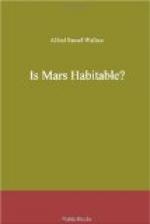No Spectroscopic Evidence of Water Vapour.
As Sir William Huggins is the chief authority quoted for this fact, and is referred to as being almost conclusive in the third edition of Miss Clerke’s History of Astronomy in 1893, I have ascertained that his opinion at the present time is that “there is no conclusive proof of the presence of aqueous vapour in the atmosphere of Mars, and that observations at the Lick Observatory (in 1895), where the conditions and instruments are of the highest order, were negative.” He also informs me that Marchand at the Pic du Midi Observatory was unable to obtain lines of aqueous vapour in the spectrum of Mars; and that in 1905, Slipher, at Mr. Lowell’s observatory, was unable to detect any indications of aqueous vapour in the spectrum of Mars.
It thus appears that spectroscopic observations are quite accordant with the calculations founded on the molecular theory of gases as to the absence of aqueous vapour, and therefore presumably of liquid water, from Mars. It is true that the spectroscopic argument is purely negative, and this may be due to the extreme delicacy of the observations required; but that dependent on the inability of the force of gravity to retain it is positive scientific evidence against its presence, and, till shown to be erroneous, must be held to be conclusive.
This absence of water is of itself conclusive against the existence of animal life, unless we enter the regions of pure conjecture as to the possibility of some other liquid being able to take its place, and that liquid being as omnipresent there as water is here. Mr. Lowell however never takes this ground, but bases his whole theory on the fundamental identity of the substance of the bodies of living organisms wherever they may exist in the solar system. In the next two chapters I shall discuss an equally essential condition, that of temperature, which affords a still more conclusive and even crushing argument against the suitability of Mars for the existence of organic life.
CHAPTER V.
THE TEMPERATURE OF MARS—MR. LOWELL’S ESTIMATE.
We have now to consider a still more important and fundamental question, and one which Mr. Lowell does not grapple with in this volume, the actual temperatures on Mars due to its distance from the sun and the atmospheric conditions on which he himself lays so much stress. If I am not greatly mistaken we shall arrive at conclusions on this subject which are absolutely fatal to the conception of any high form of organic life being possible on this planet.




